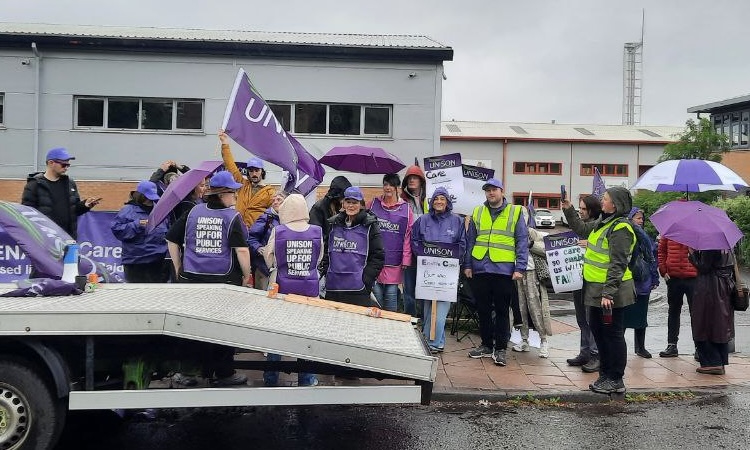A little over two years on from P&O Ferries’ decision to sack its workers via a video message, chief executive Peter Hebblethwaite admitted to a House of Commons select committee on 7 May that he could not survive on £4.87 an hour.
Why was he asked about this particular figure, when the legal minimum wage for workers over 21 is £11.44? When even much-abused ‘apprentices’ are supposed to be paid £6.44 an hour while in training? Because that is what some of the agency workers, whom he brought in to replace almost 800 staff he fired in 2022, are receiving for their labour-time.
A CEO who earns every penny of his astronomical salary
Mr Hebblethwaite could not live on £4.87 per hour, but thankfully for him he doesn’t have to. He is paid an annual salary of £325,000, which equates to around £156.25 per hour – a wage that anyone could probably survive on with a bit of careful budgeting and cutting down on luxuries.
Of course, Hebblethwaite’s job is no walk in the park. Just as he has to make tough decisions like how best to sack 800 staff, he also has to deal with difficult dilemmas like whether or not to accept a further £183,000 bonus on top of his ‘basic’ salary.
Hebblethwaite must have been torn. What was he to do? One can imagine the nights of restless sleep he suffered as he ruminated on this weighty matter. Eventually he came to a decision. He had, he told the committee, “reflected on accepting that payment. But ultimately, I did decide to accept it. And I do recognise that is not a decision that everybody would have made. And I do recognise there are people in this room who would not have made the same decision, but it is the decision that I made.”
As Labour MP Andy McDonald pointedly remarked, Mr Hebblethwaite has made many avowedly ‘difficult’ decisions, yet managed to personally benefit from every single one.
In 2022, P&O joined a long list of major companies, including Asda and British Gas, deploying ‘fire and rehire’ tactics to restore profitability. This involves giving notice of redundancy to the workforce at the same time as offering them new contracts of employment on far less favourable terms. If the new contract is not signed, then the redundancy stands.
Toothless oversight mechanisms fail at the first hurdle
As further evidence that employment law in this country is written by and for the employers, the government, under pressure from an outraged public, referred P&O’s outrageous action to the Insolvency Service for ‘investigation’. This little-known body describes itself as “a government agency that helps to deliver economic confidence by supporting those in financial distress, tackling financial wrongdoing and maximising returns to creditors”.
Presumably the referral was over ‘wrongdoing’ and was aimed at having Hebblethwaite disqualified as a director. The service duly reported that there was “no realistic prospect of a conviction”, however – an assessment based on the fact that P&O’s actions, whilst clearly unconscionable, were perfectly within the law.
Meanwhile, some of the terminated workers took direct action in response to their abrupt dismissal, refusing to leave their vessels. With little or no wider union or public support, they were eventually forcibly removed by security guards (who were paid £14.50 an hour).
On his decision to sack nearly 800 workers via a Zoom call, Hebblethwaite said: “I regret it. And I am deeply sorry for the impact it had on 786 seafarers and their families. I wish we’d never had to make that decision.”
He did not say that he would not do the same again, however. Clearly, as a dedicated servitor of the robber barons of capital, he absolutely would.
Meanwhile, P&O Ferries’ parent company, Dubai-based DP World, continued to receive subsidies from the British government even after the sackings and after the government’s half-hearted attempts to pursue its prosecution – which does rather suggest that the referral to the Insolvency Service was entirely performative.
According to ITV News: “British International Investment (BI), which operates as part of the Foreign, Commonwealth and Development Office, had made disbursements of $290m to DP World for ‘supporting the modernising and expansion of three ports in Dakar, Sokhna and Berbera’.”
P&O’s former workers have found out the hard way that the deck is stacked against them. They were made redundant because their employer was losing £100m a year, yet Hebblethwaite and thousands like him in industries around the world continue to live extravagant lifestyles whilst ‘earning’ exorbitant salaries and bonuses.
Workers across Britain and the world must receive the message that P&O, DP World and the government are sending them: the capitalist state exists to protect the interests of big business, of finance – of capitalist-imperialism itself. It is not a neutral entity with no horse in the race: it will always pick a side, and that will never be the side of the working class.










